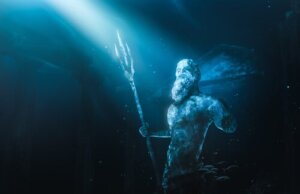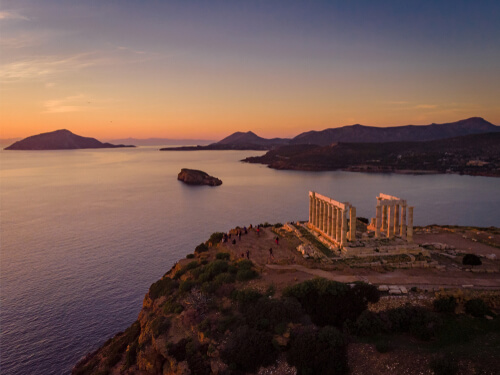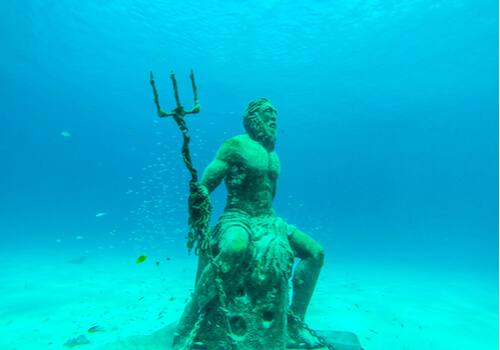The Myth of Poseidon, God of the Ocean


Reviewed and approved by the psychologist Sergio De Dios González
The story of Poseidon is one of the most important ancient Greek myths. It tells how the Olympic gods defeated the Titans, commanded by Cronos, the supreme divinity at that time.
After the triumph, the new deities shared out the world. Zeus was left with the sky, while the underworld was reserved for Hades, and Poseidon got the water.
The Greeks thought that the earth was an element that floated on ‘primal waters’. For the same reason, the myth of Poseidon indicates that this god governed the telluric currents. He was also associated with certain mental disturbances as well as horses and bulls.
The god of the oceans was an active participant in various episodes of Greek mythology. Indeed, he was present at the founding of Athens and also had a leading role in the famous Trojan War.
In fact, the myth of Poseidon claims that he was responsible for Odysseus taking many years to return to his land to meet his beloved Penelope.
“But more wonderful than the lore of old men and the lore of books is the secret lore of ocean.”
-H.P. Lovecraft-

The myth of Poseidon
In Greek mythology, before the gods of Olympus appeared, Cronus reigned. An oracle assured this god that one of his sons would dethrone him. For that reason, every time Cronus had a son, he swallowed it.
However, the future god of the oceans was saved from that fate by a ruse carried out by his mother, Rhea.
Rhea pretended to have given birth to a foal and Cronus swallowed it. Meanwhile, she hid her son in a flock of sheep. Arne, daughter of Aeolus, the god of the winds, was his nursemaid. Later, Poseidon was raised by the Telchines. They had the heads of dogs and fish fins for hands.
The Telchines were skilled in the art of blacksmithing and metallurgy. They made an instrument for Poseidon that would later become his symbol, the trident.
Eventually, with his brother Zeus, Poseidon fought Cronus and they won. After the victory, Poseidon was left with dominance over the world’s oceans.
The rise of Athens
According to the myth of Poseidon, Athens was becoming a prosperous city and both Athena and Poseidon wanted to be its rulers. The conflict was finally to be settled by Cécrops, king of the Athenians. To influence his decision, each of the two gods gave him a gift.
Poseidon struck the earth with his trident and a spring of water was born, which he gave to the city. However, he only ruled over the seas, so the water that gushed out was salty, which was of little use to the city.
Meanwhile, Athena taught the king the secrets of olive cultivation. This impressed Cécrops, who immediately named her patron of the city.
Poseidon became enraged and flooded part of the region with his salty waters. Later, he claimed the life of the successor of the king who’d given the patronage of Athens to Athena.
Even so, the Greeks always worshipped him since, as seafaring people, they couldn’t do without his protection during their voyages.

The great offspring of Poseidon
Like other Olympian gods, Poseidon wasn’t a model of fidelity, quite the opposite, in fact. Formally, his wife was the nymph Amphitrite, goddess of the calm sea.
As a wedding gift, the god of the oceans gave her a crown made of pearls and shells. She didn’t really want to marry him but accepted after one of his messengers begged her.
After the union, Poseidon had many love affairs with goddesses, nymphs, and mortals. Consequently, he had many offspring. One of his lovers was a woman named Tyro.
She was married, but she was in love with a river god, Eniopeus. Poseidon impersonated him and their union resulted in twin boys who later become heroes. They were Pelias and Neleus.
Poseidon raped a maiden named Caeneus, who asked him to turn her into a male warrior and the god agreed. He also had an affair with his granddaughter, Alope.
Poseidon frequently transformed himself into an animal to possess the women he desired. This meant he had children without human form. For example, Arion, a horse who had the gift of speech, and the winged ram, Chrysomallos, (the Golden Fleece).
All cited sources were thoroughly reviewed by our team to ensure their quality, reliability, currency, and validity. The bibliography of this article was considered reliable and of academic or scientific accuracy.
- Hamp, E. P. (1970). Postscript on Demeter and Poseidon. Minos: Revista de filología egea, (10), 93-95.
- Abascal, J. M., & Alföldy, G. (1998). Zeus Theos Megistos en Segobriga. Archivo español de arqueología, 71(177-178), 157-168.
- Lang, M. L. (2021). Reverberation and Mythology in the Iliad. In Approaches to Homer (pp. 140-164). University of Texas Press.
This text is provided for informational purposes only and does not replace consultation with a professional. If in doubt, consult your specialist.








